Complaints spike over subpar baby formula imports
Updated: 2013-07-29 01:01
By Zhou Wenting (China Daily)
|
||||||||
Consumers' low confidence in domestic baby formula has led to a surge in complaints against imported baby formulas as some businesses turn to inferior foreign brands, experts said.
Nearly two-thirds of the complaints that the China Consumers' Association received about baby formula in the first half of the year were about foreign brands.
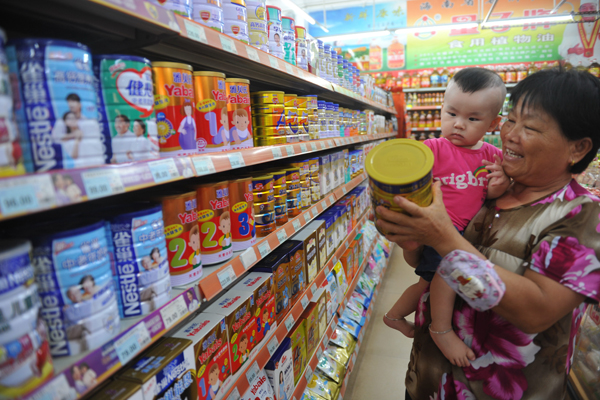 |
|
Having low confidence in domestic baby formula brands, Chinese consumers have turned to imported formula but are finding a growing number of problems with those products, too. Meng Zhongde / for China Daily |
The association received 744 complaints about infant formula in the last six months, double the number in the same period last year.
The association declined China Daily's request on Sunday to say which brands got the most complaints.
Nearly 90 percent of the complaints were over quality issues, such as finding foreign objects — including worms and iron wire — in the cans.
Some infants suffered adverse effects such as diarrhea and allergic reactions, and some products were found being sold after their expiration dates.
Industry experts said that one reason for the rise in complaints against imported brands is that some Chinese businesspeople have been taking advantage of consumers' blind trust in such brands.
Heitiki, a milk powder brand which its distributor in Shenzhen claims is "a top brand" in New Zealand, was discovered in 2011 to be registered by Chinese businesspeople and unknown to New Zealanders.
"Some so-called foreign brands are not really worthy of the name. They're high in price but inferior in quality," said Qiu Baochang, head of the legal team of the China Consumers' Association.
Xile Lier, the Suzhou partner of the Swiss baby formula manufacturer Hero Group, was accused of deliberately mislabeling milk powder in March.
The company changed the expiration dates and relabeled formula for older babies as the pricier ones for younger babies. The infant formula is sold on the Chinese mainland under the label "Hero Nutradefense".
"Customers turned to foreign brands, especially when it came to baby formula, after 2008 (when the melamine-contaminated baby formula scandal occurred)," said Wang Dingmian, chairman of the Guangzhou Dairy Association. "Some Chinese people have sniffed out a business opportunity."
Products manufactured and imported from overseas but targeted solely at China have taken root in recent years, Wang said.
Dairy companies should be cautious about quality issues to prevent a crisis in brand trust, said Lin Jun, director of a dairy company that registers and imports milk products from New Zealand but sells solely in China.
"In addition to self-inspections and tests conducted by Sutton Group, which would weed out any batch that fails to meet standards, New Zealand authorities test to see whether the baby formulas meet the national standards there, which allows the products to be shipped overseas," Lin added.
The products also need to pass all nutrition and bacterial-residual tests to attain approval from China's Entry-Exit Inspection and Quarantine Bureau to enter the country, he said.
Because some complaints involved sales practices of brick-and-mortar and online stores, experts urged efforts be made to close legal loopholes that overseas purchasing agents take advantage of.
Cao Mingshi, deputy secretary-general of Shanghai Dairy Association, said online sales are a problem as well.
"Many people have joined overseas purchasing of infant formula in recent years to grab a share of the booming business, but most of them sell online and don't hold certificates of food circulation permits as regular food sellers do," Cao said.
More than 133,000 baby formula products labeled "purchased overseas" were found on Taobao, China's leading e-commerce platform, on Sunday.
Zhang Qing, the father of a 3-year-old girl in Shanghai, said regulation of the industry should be tightened.
"To echo Premier Li Keqiang's requirement of ensuring supervision of baby formula be as strict as it is for medicine, the country should regulate the online market of baby formula as much as it does for medicine," he said.
Drugmakers and drugstores can sell medicines online only with the approval of the China Food and Drug Administration.
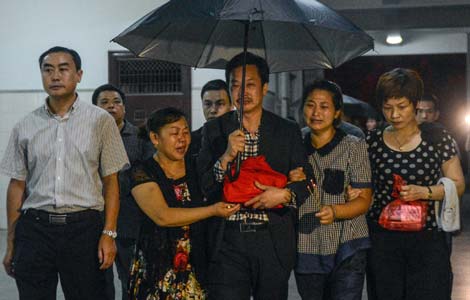
 Asiana crash victims' ashes returned to relatives
Asiana crash victims' ashes returned to relatives
 7 killed in Florida shooting spree
7 killed in Florida shooting spree
 Sun Yang takes gold in 400m freestyle
Sun Yang takes gold in 400m freestyle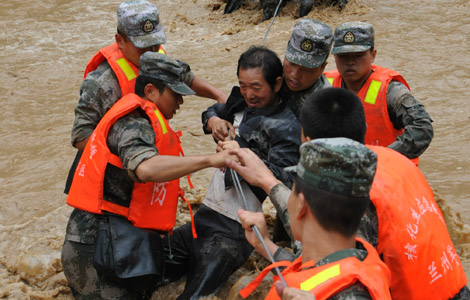
 Six dead, 12 missing in landslides, floods
Six dead, 12 missing in landslides, floods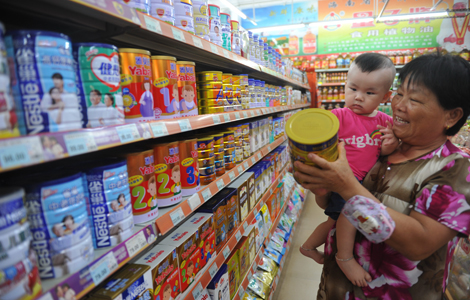
 Complaints spike over subpar baby formula imports
Complaints spike over subpar baby formula imports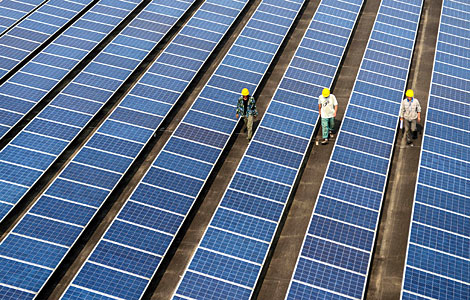
 EU solar trade dispute diffused
EU solar trade dispute diffused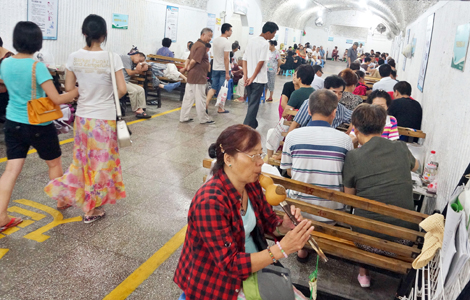
 Deliveries up as mercury rises
Deliveries up as mercury rises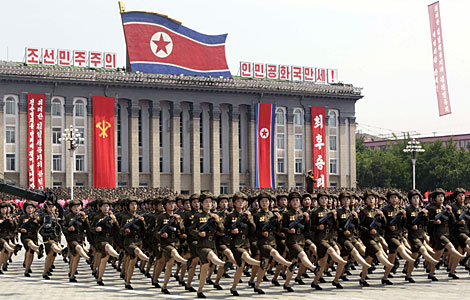
 DPRK stages military parade
DPRK stages military parade
Most Viewed
Editor's Picks

|

|

|

|

|

|
Today's Top News
Pakistan condemns latest US drone strike
Experts advise CEOs on how to make it in the US
Israeli-Palestinian peace talks to resume
Latest US-China talks should smooth the way
Audit targets local government debt
30 people killed in Italy coach accident
Brain drain may be world's worst
Industry cuts cloth to measure up to buyers' needs
US Weekly

|

|








